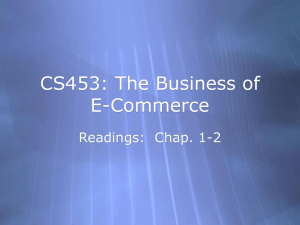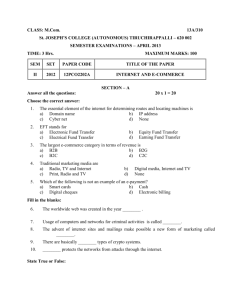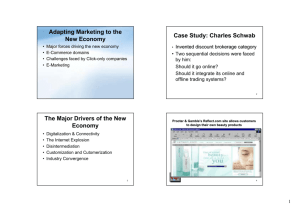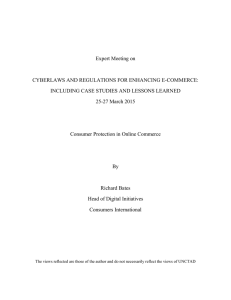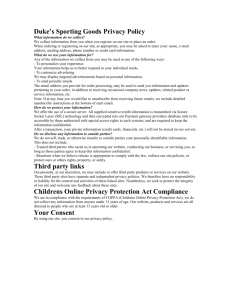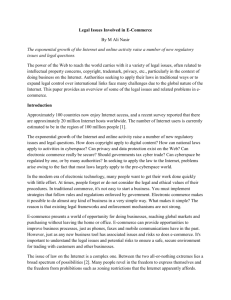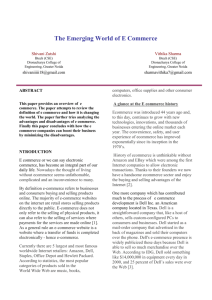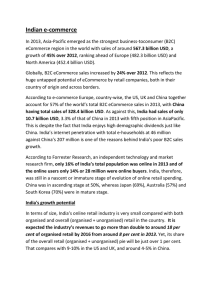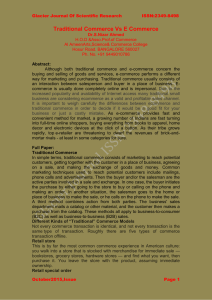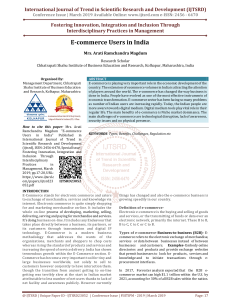CS453: The Business of E
advertisement
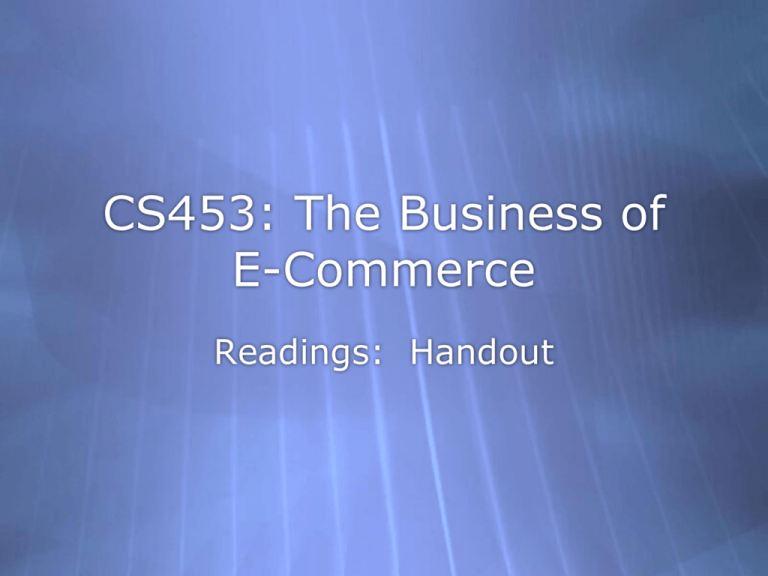
CS453: The Business of E-Commerce Readings: Handout Why E-Commerce? Using the Internet is a given now Let’s reflect (back perhaps) on what it offers companies Better access to customers Cost reductions for services provided Opportunity to deliver new products or services that would be impossible without the network Better Access to Customers Reasons? Quantity, frequency, quality Explain! Examples! Quantity, Frequency More people can visit a site than a store Global presence Anytime access Better Access to Customers (2) Quality Learn preferences, target advertising Email news and information Offer discounts, etc. Customer service Two-way communication Benefits for a Traditional Business View Global presence not as hard Mass distribution now easier, cheaper Maybe: costs shifted? Scalability? Others pay part of costs (NWs, access) Up to date info and products Searchable Another List: 8 Unique Features Ubiquity Global Reach Universal Standards Richness Interactivity Information Density Personalization / Customization Social Technology Discussion Has the Net Changed the Business World? Of course, in many ways Consider concentration vs. empowerment Think of Walmart vs. the local small-town general store What are some issues here? Concentration vs. Empowerment Big store Many customer benefits Takes over How can a small store survive? Meet some need Walmart can’t Niche market, specialization Discuss: examples in Ecommerce? Your Examples Concentration vs. Empowerment Business on the Internet supports both Businesses supporting niche markets can succeed better than without the net Of course large companies are successful too Changes in Competition between Businesses Traditional roles and distributions are short-circuited Consider what banks did 20 years ago No other options New combinations of loans, investing, money management, getting financial info Banks, investment houses, insurance companies, new startups,… Creeping Costs SW Engineering has taught us things about system life-cycles and costs over time How do you think these might apply to companies that begin to provide services on the Web? Discuss! SW Engin. Lessons? SW Engin. Lessons? Maintenance costs over time Success hurts New features needed Environment changes Systems degrade over time Usability matters Scalability Topics in this Slideset A “commerce value chain” From Chap. 2 Treese and Stewart textbook Identifying customers Marketing to customers International issues Legal issues 1. What’s the Commerce Value Chain? Generally: Value added during the process of creating and delivering a product or service Commonly used to describe manufacturing of things Consider Value-Added Tax (VAT) based systems Treese and Stewart’s View Certainly a commerce-value chain (CVC here) for underlying business’ products Also one directly tied to ecommerce Focused on customers Value Chains (in general) Way of organizing activities a business unit does to design, …, support products or services (See p. 26ff in handout) At each stage, how can things be improved? And can the internet help? Chain for Internet Systems Four parts: Attract; Interact; Act; React Attract Get and keep customer interest Activities: advertising, marketing Interact Turn interest into orders Content/product driven: web pages, info, query results, etc. Activities: Chain for Internet Systems (2) Act Process and manage orders Activities: Order processing -- shopping carts, taxation, shipping charges) Payment processing -- account, credit cards, third-party financial companies, etc. Fulfillment -- deliver hard goods, packing, shipping; carry out e-service; deliver digital goods (file, software, license) Chain for Internet Systems (3) React Service customers, order tracking, returns, warranties, rebates, help services Another View Of course it’s not linear Not necessarily even sequential now Attract Interact React Act Comments on This Relatively simple ideas here Reasonable as a framework for partitioning the domain of ecommerce topics, components At different points in this chain Businesses can fail or succeed Businesses can focus Differentiation Can you think of an example? 2. Defining the Customer With the web, anyone can be That’s good news and bad news General public vs. specialized companies or employees within companies E.g. a Motorola engineer looking for ICs for a new cell-phone design How that person’s need different than you or me buying a book or song? Is it Important to Design for Customer Types? Many e-commerce sites assume one kind of customer Examples where a mismatch is a problem? Examples of sites that don’t? Things to consider Home consumer vs. corporate Novice vs. expert Age 3. Marketing on the Internet Why does this matter more now than, say, in 2000? Your ideas: Why is Marketing Different on the Internet? Can reach many more people anywhere More competition Identity more easy to conceal Who are you? Big company or not? Scam artist or market leader? New media and multi-media the norm Harder or not clear how to get placement, presence or attention No longer just ads in print, TV or radio Search, ad auctions, email, blogs, YouTube,… What’s the Same? Customer identity, needs, wants Clear messages Effective presentation Tracking and measuring success Internet Customer Demographics Remember when mom and dad didn’t surf the web? :-) Students, university types, technologists,… One interface, many demographics E.g. kids and adults use search engines Should they really be finding the same things Note how in the non-internet world there are different marketing channels Strategies One-to-one marketing Email Profiles on sites like Google (“customers like you were also interested in…” Mass marketing (dead or not?) Convergence With other media sources Targeted ads On sites, in applications, with query results Search and Marketing Originally, search didn’t include marketing “Gaming the system” became the norm Search sites tied ads in with user searches Ad auctions Specialized search Sites by price Sites like Priceline Sites like Travelocity (car or hotel with that flight?) 4. International Issues Global customers, content Making sites work for international customers Language; monetary conversions; taxes; shipping; customs and other laws Customs, norms, conventions Products for international customers Software: internationalization Services: sites, games, … Privacy Laws governing info privacy etc. E.g. Google and Yahoo in China 5. Legal Issues Privacy Policies Practical security for customer info and company info Authorization, digital signatures, etc. Government regulation Privacy Export rules (e.g. cryptography) Summary Internet Commerce: a brave new world? Some things aren’t so different? Quickly face global and legal issues that in the past only large companies dealt with Commerce Value Chain A guide to organizing a business plan or a system? A framework for talking about business’ efforts Next: Business strategies
